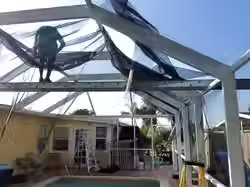Understanding Common Causes of Pool Screen Damage
- Carson O'Donnell
- Sep 8, 2025
- 4 min read
When I first installed a pool screen enclosure, I thought it would be a set-it-and-forget-it kind of deal. But over time, I noticed small tears and holes appearing in the screen. It made me realize that pool screens, while durable, face a variety of challenges that can cause damage. Understanding these common screen damage causes can help you protect your investment and keep your outdoor space enjoyable.
In this post, I’ll walk you through the most frequent reasons pool screens get damaged, how to spot early signs, and what you can do to prevent or fix these issues. Whether you’re dealing with minor wear or considering professional help, this guide will give you practical insights to keep your pool enclosure in great shape.
Common Screen Damage Causes You Should Know
Pool screens are exposed to many elements, and several factors can contribute to their wear and tear. Here are some of the most common causes I’ve come across:
1. Weather and Environmental Factors
Living in the Tampa Bay area means dealing with intense sun, heavy rain, and occasional storms. These weather conditions can take a toll on your pool screen.
Sun Exposure: Prolonged UV rays weaken the screen material, making it brittle and prone to tearing.
Wind: Strong gusts can cause the screen to flap or stretch, leading to rips or loosening from the frame.
Rain and Humidity: Moisture can cause corrosion on the frame and promote mold or mildew growth on the screen.
Regularly inspecting your screen after storms or extreme weather can help catch damage early before it worsens.
2. Physical Impact and Accidents
Sometimes, damage happens because of accidental impacts. This could be from:
Branches or debris blown by the wind hitting the screen.
Pets or wildlife scratching or clawing at the mesh.
Children playing near the enclosure and accidentally pushing or hitting the screen.
I’ve found that trimming nearby trees and keeping an eye on pets around the pool area can reduce these risks significantly.
3. Aging and Material Fatigue
Even with the best care, pool screens don’t last forever. Over time, the materials naturally degrade.
The mesh can become brittle and tear more easily.
The frame may weaken or corrode, causing the screen to sag or detach.
Fasteners and seals can loosen, creating gaps where insects or debris can enter.
Routine maintenance and timely repairs can extend the life of your pool screen and keep it looking fresh.

Close-up view of torn pool screen mesh showing damage
How Much Does It Cost to Replace a Pool Panel?
One question I often get asked is about the cost of replacing a pool screen panel. The price can vary depending on several factors:
Size of the panel: Larger panels require more material and labor.
Type of screen material: Standard fiberglass mesh is usually less expensive than heavy-duty or pet-resistant screens.
Frame condition: If the frame is damaged, it may need repair or replacement, adding to the cost.
Labor rates: Prices can differ based on the service provider and location.
On average, replacing a single pool screen panel can range from $100 to $300. If multiple panels need replacement or if the entire enclosure requires rescreening, the cost will be higher.
I recommend getting a detailed quote from a trusted provider to understand the full scope and cost. For reliable and professional help, consider pool screen repair services that specialize in quality workmanship and lasting results.
Tips to Prevent Pool Screen Damage
Prevention is always better than repair. Here are some practical steps I’ve taken to protect my pool screen:
Trim trees and bushes: Keep branches away from the screen to avoid scratches and punctures.
Secure pets: Train pets to stay away from the screen or use pet-resistant mesh if needed.
Clean regularly: Remove dirt, leaves, and debris to prevent mold and maintain screen integrity.
Inspect after storms: Check for loose or damaged areas and address them promptly.
Avoid harsh chemicals: Use gentle cleaning solutions to prevent weakening the screen material.
By following these tips, you can extend the life of your pool enclosure and enjoy your outdoor space without worry.

Eye-level view of pool enclosure with clean and intact screen
When to Call for Professional Pool Screen Repair Services
Sometimes, damage is beyond what you can fix yourself. If you notice:
Large tears or holes in the screen
Sagging or detached panels
Rust or corrosion on the frame
Persistent insect or debris intrusion
It’s time to call in the experts. Professional pool screen repair services have the tools and experience to restore your enclosure efficiently. They can also advise on the best materials and upgrades to prevent future damage.
Choosing a reputable company ensures the job is done right the first time, giving you peace of mind and a beautiful, functional pool area.
Enjoying Your Outdoor Space with Confidence
Understanding the common screen damage causes helps you stay ahead of problems and maintain a safe, comfortable pool environment. With regular care and timely repairs, your pool screen enclosure can last for many years, protecting you from bugs, debris, and harsh weather.
Remember, investing in quality materials and professional services pays off in the long run. If you ever need assistance, don’t hesitate to reach out to trusted pool screen repair services in the Tampa Bay area. They’re ready to help you keep your outdoor space inviting and worry-free.

High angle view of backyard pool with screened enclosure




Comments